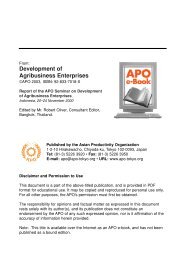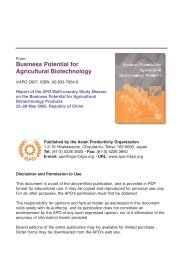Annual Report 2009 - Asian Productivity Organization
Annual Report 2009 - Asian Productivity Organization
Annual Report 2009 - Asian Productivity Organization
You also want an ePaper? Increase the reach of your titles
YUMPU automatically turns print PDFs into web optimized ePapers that Google loves.
one power plant, and one hospital) and several expert<br />
lectures.<br />
The 3Rs (Reduce, Reuse, and Recycle)<br />
The concept of the 3Rs (reduce, reuse, and recycle) is<br />
being emphasized worldwide as an easy, effective way<br />
to protect our environment by minimizing resources<br />
and waste. The APO’s GP strategy helps implementation<br />
of the 3Rs in a structured, systematic way.<br />
The APO held the first project on the 3Rs in<br />
Phitsanulok, Thailand, in 2006 where the participants<br />
learned about effective waste recycling through a<br />
successful local case study of the “Waste Bank.” That<br />
project attracted widespread attention from member<br />
countries, and subsequently a similar project was held<br />
in Thailand in 2007, followed by a seminar on the 3Rs<br />
in Japan in 2008.<br />
The 3Rs project in <strong>2009</strong> was in the form of a seminar<br />
targeting the private sector and provided participants<br />
with the opportunity to learn the best practices of<br />
the 3Rs in Japan and to develop action plans for<br />
introducing compatible methodologies in their own<br />
organizations. The workshop was held in Tokyo,<br />
28 September–2 October, in collaboration with the<br />
Ministry of Economy, Trade and Industry of Japan<br />
and JPC. It was attended by 18 participants from 14<br />
member countries.<br />
Program coverage: Current scenario and prospective<br />
of the 3Rs in Japan and the region; 3R implementation<br />
from the aspect of regulation and law; 3R policy;<br />
Issues and challenges of 3Rs in the <strong>Asian</strong> context; and<br />
Reuse business. The individual country papers were<br />
presented and discussed on the afternoon of Day 2 of<br />
the workshop. Site visits were made to Re-Tem Corporation,<br />
Hyper Cycle Systems, Sai-no-Kuni Resource<br />
Recycling Factory, Orix Resource Recycling Services<br />
Corporation, I’ll Clean-Tech, and Um-Welt-Japan.<br />
e-Waste Management<br />
e-Waste can be defined as electrical and electronic<br />
equipment/devices/products that connect with power<br />
plugs or use batteries which have become outdated/<br />
obsolete due to advances in technology or changes in<br />
fashion, style, and status and/or are nearing the end<br />
of their useful life. It is becoming a major problem<br />
worldwide due to rapid advances in IT. It is also<br />
significant due to the dumping of e-waste such as computers<br />
by developed countries in developing countries,<br />
which results in severe environmental degradation.<br />
Most APO member countries have no laws or specific<br />
regulations to deal with e-waste.<br />
The APO therefore organized a workshop on e-Waste<br />
Management, in Taipei, 12–16 October, in association<br />
with the CPC and Taiwan Environmental Manufacturers<br />
Association. The workshop was attended by 23<br />
participants from 13 member countries. The objectives<br />
were to review current e-waste generation, storage,<br />
processing, and disposal scenarios in member countries;<br />
deliberate on policies and recent initiatives for<br />
e-waste management; assess adverse environmental<br />
impacts due to improper disposal of e-waste and<br />
their effects on economies; evolve methods for the<br />
systematic management of e-waste using the Green<br />
<strong>Productivity</strong> approach; and develop individual action<br />
plans for introducing effective e-waste management<br />
mechanisms. Three international resource persons deputed<br />
by the APO conducted sessions and facilitated<br />
discussions.<br />
Program coverage: Assessment of current e-waste<br />
generation in member countries; Review of e-waste<br />
storage, handling, processing, and disposal practices;<br />
Identifying suitable technologies for e-waste management;<br />
Formulating policy measures for addressing<br />
e-waste issues; Assessing the role of the private and<br />
public sectors in e-waste management; and Advanced<br />
technology for implementation of effective e-waste<br />
management in the Republic of China. E&E Recycling,<br />
Inc. and Super Dragon Technology Industry<br />
hosted field visits to demonstrate their e-waste<br />
management techniques.<br />
Certified Lead Auditors of the Environmental<br />
Management System (ISO14001)<br />
An environmental management system (EMS) refers<br />
to the management of an organization’s environmentrelated<br />
activities in a comprehensive, systematic,<br />
planned, documented manner. It includes the organizational<br />
structure, planning, and resources for<br />
developing, implementing, and maintaining a policy<br />
for environmental protection. The establishment of<br />
the EMS ISO14001 was the result of a worldwide focus<br />
on the environment, encouraging a cleaner, safer,<br />
healthier world. The APO has organized a number of<br />
projects related to the EMS ISO14001.<br />
In <strong>2009</strong>, an e-learning training course was organized<br />
from July–September in three phases in which 225<br />
participants from 13 member countries logged on. As<br />
a follow-up, a face-to-face training course for Certified<br />
Lead Auditors of the Environment Management System<br />
(ISO14001) was organized in association with the<br />
NPS, 2–6 November, in Colombo for 20 participants<br />
from 13 member countries. The objective was to train<br />
participants to become EMS auditors and develop and<br />
operate EMS in compliance with ISO14001.<br />
Program coverage: Overview of management systems,<br />
audits, and certification process; Understanding the<br />
ISO14001 standard; Requirements of ISO14001; How<br />
APO ANNUAL REPORT <strong>2009</strong> 35<br />
INTERFACE SECTOR
















